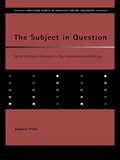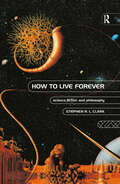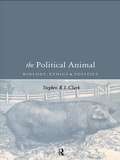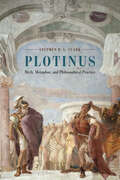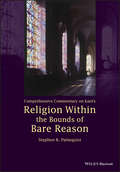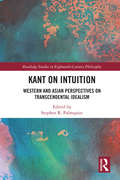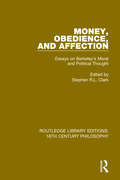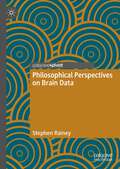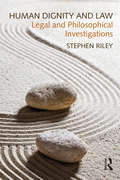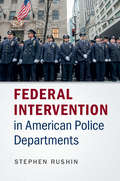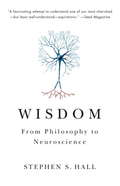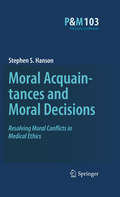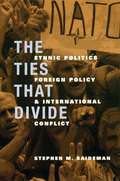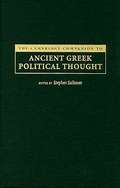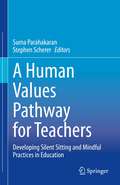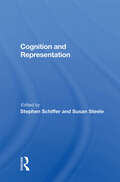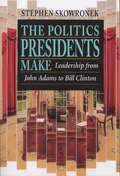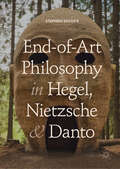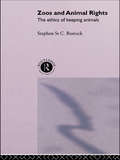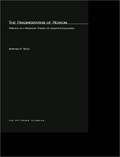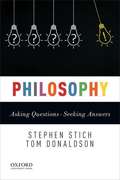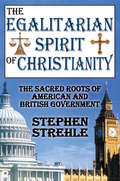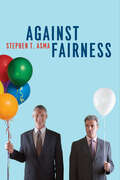- Table View
- List View
The Subject in Question: Sartre's Critique of Husserl in The Transcendence of the Ego (Routledge Studies in Twentieth-Century Philosophy)
by Stephen PriestThe Subject in Question provides a fascinating insight into a debate between two of the twentieth century's most famous philosophers - Jean-Paul Sartre and Edmund Husserl - over the key notions of conscious experience and the self. Sartre's The Transcendence of the Ego, published in 1937, is a major text in the phenomenological tradition and sets the course for much of his later work. The Subject in Question is the first full-length study of this famous work and its influence on twentieth-century philosophy. It also investigates the relationship between Sartre's ideas and the earlier work of Descartes and Kant.
Animals and Their Moral Standing
by Stephen R. Clark Stephen R ClarkTwenty years ago, people thought only cranks or sentimentalists could be seriously concerned about the treatment of non-human animals. However, since then philosophers, scientists and welfarists have raised public awareness of the issue; and they have begun to lay the foundations for an enormous change in human practice. This book is a record of the development of 'animal rights' through the eyes of one highly-respected and well-known thinker. This book brings together for the first time Stephen R.L. Clark's major essays in one volume. Written with characteristic clarity and persuasion, Animals and Their Moral Standing will be essential reading for both philosophers and scientists, as well as the general reader concerned by the debates over animal rights and treatment.
How to Live Forever: Science Fiction and Philosophy
by Stephen R ClarkImmortality is a subject which has long been explored and imagined by science fiction writers. In his intriguing new study, Stephen R.L.Clark argues that the genre of science fiction writing allows investigation of philosophical questions about immortality without the constraints of academic philosophy. He reveals how fantasy accounts of issues such as resurrection, disembodied survival, reincarnation and devices or drugs for preserving life can be used as an important resource for philosophical inquiry and examines how a society of immortals might function through a reading of the vampire myth. How to Live Forever is a compelling study which introduces students and professional philosophers to the possibilities of using science fiction in their work. It includes extensive suggestions for further reading, both fictional and philosophical, and examines the work of such major science fiction authors as Arthur C. Clarke, Frank Herbert, Larry Niven, William Gibson, and Colin Wilson.
The Political Animal: Biology, Ethics and Politics
by Stephen R Clark Stephen R.L ClarkPeople, as Aristotle said, are political animals. Mainstream political philosophy, however, has largely neglected humankind's animal nature as beings who are naturally equipped, and inclined, to reason and work together, create social bonds and care for their young. Stephen Clark, grounded in biological analysis and traditional ethics, probes into areas ignored in mainstream political theory and argues for the significance of social bonds which bypass or transcend state authority. Understanding the ties that bind us reveals how enormously capable we are in achieving civil order as a species. Stephen Clark advocates that a properly informed political philosophy must take into account the role of women, children, animals, minorities and the domestic virtues at large. Living and comnducting our political lives like the animals we are is a more congenial prospect than is usually supposed.
Plotinus: Myth, Metaphor, and Philosophical Practice
by Stephen R. ClarkPlotinus, the Roman philosopher (c. 204-270 CE) who is widely regarded as the founder of Neoplatonism, was also the creator of numerous myths, images, and metaphors. They have influenced both secular philosophers and Christian and Muslim theologians, but have frequently been dismissed by modern scholars as merely ornamental. In this book, distinguished philosopher Stephen R. L. Clark shows that they form a vital set of spiritual exercises by which individuals can achieve one of Plotinus's most important goals: self-transformation through contemplation. Clark examines a variety of Plotinus's myths and metaphors within the cultural and philosophical context of his time, asking probing questions about their contemplative effects. What is it, for example, to "think away the spatiality" of material things? What state of mind is Plotinus recommending when he speaks of love, or drunkenness, or nakedness? What star-like consciousness is intended when he declares that we were once stars or are stars eternally? What does it mean to say that the soul goes around God? And how are we supposed to "bring the god in us back to the god in all"? Through these rich images and structures, Clark casts Plotinus as a philosopher deeply concerned with philosophy as a way of life.
Comprehensive Commentary on Kant's Religion Within the Bounds of Bare Reason
by Stephen R. PalmquistPalmquist's Commentary provides the first definitive clarification on Kant's Philosophy of Religion in English; it includes the full text of Pluhar's translation, interspersed with explanations, providing both a detailed overview and an original interpretation of Kant's work. Offers definitive, sentence-level commentary on Kant's Religion within the Bounds of Bare Reason Presents a thoroughly revised version of Pluhar's translation of the full text of Kant's Religion, including detailed notes comparing the translation with the others still in use today Identifies most of the several hundred changes Kant made to the second (1794) edition and unearths evidence that many major changes were responses to criticisms of the first edition Provides both a detailed overview and original interpretation of Kant's work on the philosophy of religion Demonstrates that Kant's arguments in Religion are not only cogent, but have clear and profound practical applications to the way religion is actually practiced in the world today Includes a glossary aimed at justifying new translations of key technical terms in Religion, many of which have previously neglected religious and theological implications
Kant on Intuition: Western and Asian Perspectives on Transcendental Idealism (Routledge Studies in Eighteenth-Century Philosophy)
by Stephen R. PalmquistKant on Intuition: Western and Asian Perspectives on Transcendental Idealism consists of 20 chapters, many of which feature engagements between Kant and various Asian philosophers. Key themes include the nature of human intuition (not only as theoretical—pure, sensible, and possibly intellectual—but also as relevant to Kant’s practical philosophy, aesthetics, the sublime, and even mysticism), the status of Kant’s idealism/realism, and Kant’s notion of an object. Roughly half of the chapters take a stance on the recent conceptualism/non-conceptualism debate. The chapters are organized into four parts, each with five chapters. Part I explores themes relating primarily to the early sections of Kant’s first Critique: three chapters focus mainly on Kant’s theory of the "forms of intuition" and/or "formal intuition", especially as illustrated by geometry, while two examine the broader role of intuition in transcendental idealism. Part II continues to examine themes from the Aesthetic but shifts the main focus to the Transcendental Analytic, where the key question challenging interpreters is to determine whether intuition (via sensibility) is ever capable of operating independently from conception (via understanding); each contributor offers a defense of either the conceptualist or the non-conceptualist readings of Kant’s text. Part III includes three chapters that explore the relevance of intuition to Kant’s theory of the sublime, followed by two that examine challenges that Asian philosophers have raised against Kant’s theory of intuition, particularly as it relates to our experience of the supersensible. Finally, Part IV concludes the book with five chapters that explore a range of resonances between Kant and various Asian philosophers and philosophical ideas.
Money, Obedience, and Affection: Essays on Berkeley's Moral and Political Thought (Routledge Library Editions: 18th Century Philosophy #11)
by Stephen R.L. ClarkThis book, first published in 1985, presents a key collection of essays on Berkeley’s moral and political philosophy. They form an introduction to, and analysis of, Berkeley’s immaterialist arguments, part of his consciously adopted strategy to subvert Enlightenment thought, which he saw as a danger to civil society.
Philosophical Perspectives on Brain Data
by Stephen RaineyWhere there is data there are questions of ownership, leaks, and worries about misuse. When what’s at stake is data on our brains, the stakes are high. This book brings together philosophical analysis and neuroscientific insights to develop an account of ‘brain data’: what it is, how it is used, and how we ought to take care of it. Emerging trends in neuroscience appear to make mental activity legible, through sophisticated processing of signals recorded from the brain. This can include Artificial Intelligence (AI), with algorithms classifying brain signals for further processing. These developments will have ramifications for concepts of the brain, the self, and the mind. They will also affect clinical practices like psychiatry, by modifying concepts of mental health and introducing AI-based diagnostic and treatment strategies. The issues arising are vastly complicated, little understood, but of high importance. Philosophical Perspectives on Brain Data clarifies complex intersections of philosophical and neuroscientific interest, presenting an account of brain data that is comprehensible. This account can be the basis for evaluating practices based on brain data. As such, the book aims to open a novel space for evaluating hitherto arcane areas of academic research in order to provide the necessary scope for understanding their real-world consequences. These consequences will include personal, socio-political, and public health dimensions. It is therefore vital that they are understood if their impacts upon aspects of everyday life can be evaluated adequately.
On the Digital Humanities: Essays and Provocations
by Stephen RamsayA witty and incisive exploration of the philosophical conundrums that animate the digital humanities Since its inception, the digital humanities has been repeatedly attacked as a threat to the humanities: warnings from literary and cultural theorists of technology overtaking English departments and the mechanization of teaching have peppered popular media. Stephen Ramsay&’s On the Digital Humanities, a collection of essays spanning the personal to the polemic, is a spirited defense of the field of digital humanities. A founding figure in what was once known as &“humanities computing,&” Ramsay has a well-known and contentious relationship with what is now called the digital humanities (DH). Here Ramsay collects and updates his most influential and notorious essays and speeches from the past fifteen years, considering DH from an array of practical and theoretical perspectives. The essays pursue a broad variety of themes, including the nature of data and its place in more conventional notions of text and interpretation, the relationship between the constraints of computation and the more open-ended nature of the humanities, the positioning of practical skills and infrastructures in both research and pedagogical contexts, the status of DH as a program for political and social action, and personal reflections on the author&’s journey into the field as both a theorist and a technologist. These wide-ranging essays all center around one idea: that DH not forsake its connection to the humanities. While &“digital humanities&” may sound like an entirely new form of engagement with the artifacts of human culture, Ramsay argues that the field well reveals what is most essential to humanistic inquiry.
Human Dignity and Law: Legal and Philosophical Investigations
by Stephen RileyThis book argues that human dignity and law stand in a privileged relationship with one another. Law must be understood as limited by the demands made by human dignity. Conversely, human dignity cannot be properly understood without clarifying its interaction with legal institutions and legal practices. This is not, then, a survey of the uses of human dignity in law; it is a rethinking of human dignity in relation to our principles of social governance. The result is a revisionist account of human dignity and law, one focused less on the use of human dignity in our regulations and more on its constitutive implications for the governance of the public realm.The first part conducts a wide-ranging moral, legal and political analysis of the nature and functions of human dignity. The second part applies that analysis to three fields of legal regulation: international law, transnational law, and domestic public law.The book will appeal to scholars in both philosophy and law. It will also be of interest to political theorists, particularly those working within the liberal tradition or those concerned with institutional design.
Federal Intervention in American Police Departments
by Stephen RushinFor much of American history, the federal government has played a limited role in local police regulation. That all changed in 1994, when Congress passed a little known statute that permitted the US Attorney General to reform troubled police departments. Since then, many of the nation's largest police departments - including those in Los Angeles, Chicago, Seattle, Washington, DC, New Orleans, Pittsburgh, Cincinnati, Cleveland, and Albuquerque - have been subject to federal oversight. But until recently, we've known little about how this federal process works. Drawing on original interviews, court documents, statistical data, and media reports, this book provides the first comprehensive account of federal intervention in American police departments. It shows that, under the right circumstances, federal intervention is uniquely effective at combating misconduct in police departments. However, federal intervention is far from perfect. This book concludes by arguing that Congress should expand and improve federal oversight of policing.
Wisdom: From Philosophy to Neuroscience
by Stephen S. HallA compelling investigation into one of our most coveted and cherished ideals, and the efforts of modern science to penetrate the mysterious nature of this timeless virtue. We all recognize wisdom, but defining it is more elusive. In this fascinating journey from philosophy to science, Stephen S. Hall gives us a dramatic history of wisdom, from its sudden emergence in four different locations (Greece, China, Israel, and India) in the fifth century B. C. to its modern manifestations in education, politics, and the workplace. We learn how wisdom became the provenance of philosophy and religion through its embodiment in individuals such as Buddha, Confucius, and Jesus; how it has consistently been a catalyst for social change; and how revelatory work in the last fifty years by psychologists, economists, and neuroscientists has begun to shed light on the biology of cognitive traits long associated with wisdom--and, in doing so, begun to suggest how we might cultivate it. Hall explores the neural mechanisms for wise decision making; the conflict between the emotional and cognitive parts of the brain; the development of compassion, humility, and empathy; the effect of adversity and the impact of early-life stress on the development of wisdom; and how we can learn to optimize our future choices and future selves. Hall's bracing exploration of the science of wisdom allows us to see this ancient virtue with fresh eyes, yet also makes clear that despite modern science's most powerful efforts, wisdom continues to elude easy understanding.
Moral Acquaintances and Moral Decisions
by Stephen S. HansonThe potential of modern medicine in a pluralistic world leads to the potential for moral conflict. The most prevalent bioethical theories often either overestimate or underestimate the amount of shared moral belief that can be used to address those conflicts. This work presents a means for taking seriously the pluralism in the modern world while recognizing the likelihood of moral "acquaintance" between persons with differing views. It criticizes moral theories that overstate the extent of the problem of pluralism as well as those that imply too much agreement between reasonable moral persons, yet it locates a means for the resolution of many moral conflicts in moral acquaintanceship. Drawing from the work of H. Tristram Engelhardt, Jr., casuists and principle-based theorists, and Erich Loewy and Kevin W. Wildes's initial development of the concept of moral acquaintanceship, Moral Acquaintances and Moral Decisions is philosophically indepth work with direct applications for decisionmaking in real medical settings. A work in moral theory as well as a source of real world guidance, clinically oriented bioethics professionals as well as students of bioethical theory should find the theory of moral acquaintanceship provided here important to their work.
The Ties That Divide: Ethnic Politics, Foreign Policy, and International Conflict (International Relations)
by Stephen SaidemanEthnic conflicts have created crises within NATO and between NATO and Russia, produced massive flows of refugees, destabilized neighboring countries, and increased the risk of nuclear war between Pakistan and India. Interventions have cost the United States, the United Nations, and other actors billions of dollars.While scholars and policymakers have devoted considerable attention to this issue, the question of why states take sides in other countries' ethnic conflicts has largely been ignored. Most attention has been directed at debating the value of particular techniques to manage ethnic conflict, including partition, prevention, mediation, intervention, and the like. However, as the Kosovo dispute demonstrated, one of the biggest obstacles to resolving ethnic conflicts is getting the outside actors to cooperate. This book addresses this question.Saideman argues that domestic political competition compels countries to support the side of an ethnic conflict with which constituents share ethnicities. He applies this argument to the Congo Crisis, the Nigerian Civil War, and Yugoslavia's civil wars. He then applies quantitative analyses to ethnic conflicts in the 1990s. Finally, he discusses recent events in Kosovo and whether the findings of these case studies apply more broadly.
The Cambridge Companion to Ancient Greek Political Thought
by Stephen SalkeverThe Cambridge Companion to Ancient Greek Political Thought provides a guide to understanding the central texts and problems in ancient Greek political thought, from Homer through the Stoics and Epicureans. Composed of essays specially commissioned for this volume and written by leading scholars of classics, political science, and philosophy, the Companion brings these texts to life by analysing what they have to tell us about the problems of political life. Focusing on texts by Homer, Herodotus, Thucydides, Plato, and Aristotle, among others, they examine perennial issues, including rights and virtues, democracy and the rule of law, community formation and maintenance, and the ways in which theorizing of several genres can and cannot assist political practice.
A Human Values Pathway for Teachers: Developing Silent Sitting and Mindful Practices in Education
by Suma Parahakaran Stephen SchererThis book combines perspectives from psychology, spiritual education and digital teaching pedagogies in a transnational framework to discuss the Education in Human Values Program (EHV) for child development, with a focus on silent sitting, mindfulness, meditation and story-telling as tools in the classroom. Through positive guidance in the early stages of child development using EHV tools, teachers will be better equipped to handle disciplinary issues in primary and secondary schools. These practices are also useful for the higher education community, as teachers and educators from tertiary institutions may adopt these practices in their teaching and become reflective practitioners. Topics such as teacher morale and school climate and its impact on children are discussed in relation to building resilience, reflective capacities, and inner strength (shared values) using an intrinsic and transformational approach. The discussions also include perspectives from the neurosciences. With contributions from teachers and educators from the US, South Africa, Malaysia, Australia, Hong Kong and Mauritius, this edited volume addresses the challenges, strengths and weaknesses associated with daily teaching practices in primary and secondary schools and higher education institutions. The content is relevant to policymakers and researchers in child development studies, with a particular focus on the impact of silent sitting, mindful practices, and meditation on children’s self-regulation and resilience. The authors collectively espouse that silent sitting techniques can help a child to grow and discover their hidden potential, thus enhancing their social, emotional, spiritual and physical capacities.
Cognition And Representation
by Stephen Schiffer Susan SteeleThis book is a result of a Cognitive Science program conducted to identify some of the leading issues and approaches that dominate in cognitive science research. The discussion is organized under four groups: psychological theories, mental representation, cognitive development, and semantic theory.
The Politics Presidents Make: Leadership from John Adams to Bill Clinton, Revised Edition
by Stephen SkowronekStephen Skowronek’s wholly innovative study demonstrates that presidents are persistent agents of change, continually disrupting and transforming the political landscape. In an afterword to this new edition, the author examines “third way” leadership as it has been practiced by Bill Clinton and others. These leaders are neither great repudiators nor orthodox innovators. They challenge received political categories, mix seemingly antithetical doctrines, and often take their opponents’ issues as their own.
End-of-Art Philosophy in Hegel, Nietzsche and Danto
by Stephen SnyderThis book examines the little understood end-of-art theses of Hegel, Nietzsche, and Danto. The end-of-art claim is often associated with the end of a certain standard of taste or skill. However, at a deeper level, it relates to a transformation in how we philosophically understand our relation to the ‘world’. Hegel, Nietzsche, and Danto each strive philosophically to overcome Cartesian dualism, redrawing the traditional lines between mind and matter. Hegel sees the overcoming of the material in the ideal, Nietzsche levels the two worlds into one, and Danto divides the world into representing and non-representing material. These attempts to overcome dualism necessitate notions of the self that differ significantly from traditional accounts; the redrawn boundaries show that art and philosophy grasp essential but different aspects of human existence. Neither perspective, however, fully grasps the duality. The appearance of art’s end occurs when one aspect is given priority: for Hegel and Danto, it is the essentialist lens of philosophy, and, in Nietzsche’s case, the transformative power of artistic creativity. Thus, the book makes the case that the end-of-art claim is avoided if a theory of art links the internal practice of artistic creation to all of art’s historical forms.
Zoos and Animal Rights: The Ethics Of Keeping Animals
by Stephen St BostockFirst Published in 2004. Routledge is an imprint of Taylor & Francis, an informa company.
The Fragmentation Of Reason: Preface To A Pragmatic Theory Of Cognitive Evaluation
by Stephen StichFrom Descartes to Popper, philosophers have criticized and tried to improve the strategies of reasoning invoked in science and in everyday life. In recent years leading cognitive psychologists have painted a detailed, controversial, and highly critical portrait of common sense reasoning. Stephen Stich begins with a spirited defense of this work and a critique of those writers who argue that widespread irrationality is a biological or conceptual impossibility. Stich then explores the nature of rationality and irrationality: What is it that distinguishes good reasoning from bad? He rejects the most widely accepted approaches to this question approaches which unpack rationality by appeal to truth, to reflective equilibrium or conceptual analysis. The alternative he defends grows out of the pragmatic tradition in which reasoning is viewed as a cognitive tool. Stich's version of pragmatism leads to a radical epistemic relativism and he argues that the widespread abhorrence of relativism is ill founded. Stephen Stich is Professor of Philosophy at Rutgers University and author of From Folk Psychology to Cognitive Science.
Philosophy: Asking Questions--Seeking Answers
by Stephen Stich; Tom Donaldsonit focuses on the key issues in Western philosophy, presenting balanced coverage of each issue and challenging students to make up their own minds. Each chapter incorporates discussion questions, key terms, a glossary, and suggestions for further readings to help make the material more understandable to novices.
The Egalitarian Spirit of Christianity: The Sacred Roots of American and British Government
by Stephen StrehleReligion no longer plays a dominant role in the everyday consciousness of modern Western society. Few people recognize the underlying role of religious beliefs and practices in their life choices. Stephen Strehle shows the significance and ongoing influence of religion in contemporary life by revealing the sacred roots of modern political ideas in the sixteenth and seventeenth centuries. He discusses the role of the church in government, probing into the sources of democratic, federal, and egalitarian ideas on the continent of Europe during the Reformation. The separation of church and state in America and the diminished power of the Church of England were the culmination of secular forces evolving since the Enlightenment. This secular view of life represents the basic mentality of the culture and the government in general; yet there is much to contradict it. The last half of the twentieth century witnessed a surge of grassroots movements from all sides of the political/religious spectrum. These included the civil rights movement of the 1960s and the Moral Majority of the 1980s, both of which provided an effective challenge to a simple separation of the two realms. Strehle explores some of the most cherished political ideals of modern society, including equality and democracy, liberty and natural rights, progress and capitalism, federalism and mixed government. He does not dismiss the vital contribution of other possible sources of inspiration from the world of religion or undermine the well-established place of &“secular&” sources. But he does show that certain ideas associated with the religious community have left an indelible mark upon significant aspects of the emerging American landscape.
Against Fairness
by Stephen T. Asma“Mr. Asma offers a rightly critical diagnosis of our obsession with egalitarianism.” —The Wall Street JournalIn our zealous pursuit of fairness, we have banished our urges to like one person more than another, one thing over another, hiding them away as dirty secrets of our humanity. In Against Fairness, polymath philosopher Stephen T. Asma drags them triumphantly back into the light. Through playful, witty, but always serious arguments and examples, he vindicates our unspoken and undeniable instinct to favor, making the case that we would all be better off if we showed our unfair tendencies a little more kindness—indeed, if we favored favoritism.Conscious of the egalitarian feathers his argument is sure to ruffle, Asma makes his point by synthesizing a startling array of scientific findings, historical philosophies, cultural practices, analytic arguments, and a variety of personal and literary narratives to give a remarkably nuanced and thorough understanding of how fairness and favoritism fit within our moral architecture. Drawing on thinkers from Confucius to Tocqueville to Nietzsche, he reveals how we have confused fairness with more noble traits, like compassion and open-mindedness. He dismantles a number of seemingly egalitarian pursuits, from classwide Valentine’s Day cards to civil rights, to reveal the envy that lies at their hearts, going on to prove that we can still be kind to strangers, have no prejudice, and fight for equal opportunity at the same time we reserve the best of what we can offer for those dearest to us.Watch an animated book trailer here: http://www.youtube.com/watch?v=GjPhTQ9zi5Q
